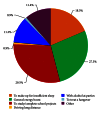The Epidemiology of Sleep Quality and Consumption of Stimulant Beverages among Patagonian Chilean College Students
- PMID: 23766919
- PMCID: PMC3671558
- DOI: 10.1155/2013/910104
The Epidemiology of Sleep Quality and Consumption of Stimulant Beverages among Patagonian Chilean College Students
Abstract
Objectives. (1) To assess sleep patterns and parameters of sleep quality among Chilean college students and (2) to evaluate the extent to which stimulant beverage use and other lifestyle characteristics are associated with poor sleep quality. Methods. A cross-sectional study was conducted among college students in Patagonia, Chile. Students were asked to complete a self-administered questionnaire to provide information about lifestyle and demographic characteristics. The Pittsburgh Sleep Quality Index (PSQI) was used to evaluate sleep quality. In addition, students underwent a physical examination to collect anthropometric measurements. Results. More than half of students (51.8%) exhibited poor sleep quality. Approximately 45% of study participants reported sleeping six hours or less per night and 9.8% used medications for sleep. In multivariate analysis, current smokers had significantly greater daytime dysfunction due to sleepiness and were more likely to use sleep medicines. Students who reported consumption of any stimulant beverage were 1.81 times as likely to have poor sleep quality compared with those who did not consume stimulant beverages (OR:1.81, 95% CI:1.21-2.00). Conclusions. Poor sleep quality is prevalent among Chilean college students, and stimulant beverage consumption was associated with the increased odds of poor sleep quality in this sample.
Figures
References
-
- CDC. Centers For Disease Control, Sleep and Sleep Disorders. Geneva, Switzerland: 2012. http://www.cdc.gov/features/sleep/
-
- IOM. Committee on sleep medicine and research. In: Colten RH, Altevogt MB, editors. Sleep Disorders and Sleep Deprivation: An Unmet Public Health Problem. Washington, DC, USA: National Academy of Sciences Press; 2006. - PubMed
-
- Chaput JP, Després JP, Bouchard C, Tremblay A. Short sleep duration is associated with reduced leptin levels and increased adiposity: results from the Québec family study. Obesity. 2007;15(1):253–261. - PubMed
-
- Ficca G, Salzarulo P. What is sleep is for memory. Sleep Medicine. 2004;5(3):225–230. - PubMed
-
- Diekelmann S, Wilhelm I, Born J. The whats and whens of sleep-dependent memory consolidation. Sleep Medicine Reviews. 2009;13(5):309–321. - PubMed
Grants and funding
LinkOut - more resources
Full Text Sources
Other Literature Sources





